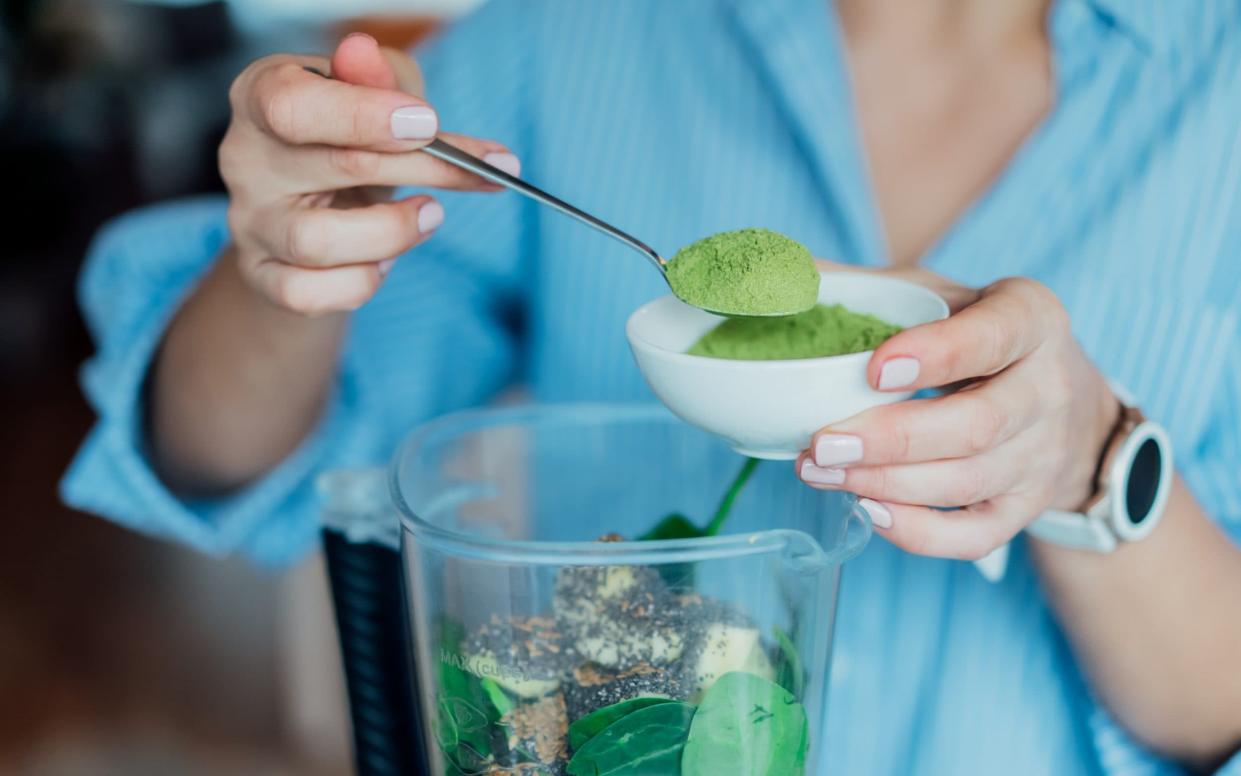The green powders that actually work and how to add them to your diet

Green powders are food supplements made from blends of dehydrated or dried fruits, vegetables, and other plant extracts. Marketed as a convenient nutritional safety net for the time-poor, they often also contain unusual “superfoods” such as algae and wheatgrass and gut-friendly probiotics and prebiotics, which may otherwise be hard to include in our diet.
They sound like a handy shortcut to better health, but do their claims stack up? Certainly, drying is an age-old preservation technique, so it seems logical that ‘greens’ in powdered form could deliver concentrated nutrients such as vitamins, minerals and antioxidants. Suggested health benefits vary from improved blood pressure to reduced inflammation, better gut health, immunity support, and increased energy. Legally, however, supplements do not have to prove their efficacy. They fall under the umbrella of the UK’s general food regulations, so as long as they are safe to ingest they can be sold.
There are some other downsides too. Processing of the ingredients can lead to a loss of fibre and potentially reduce the bioavailability of the nutrients they contain. Indeed, Public Health England has stated that fruit and vegetable powders do not count towards your five-a-day because there isn’t enough evidence that they provide equal health benefits to consuming the whole product. What studies have been conducted are small-scale and often funded by the manufacturers themselves.
Additionally, many green powders can be surprisingly high in sugar or contain artificial sweeteners or other UPF additives, so you need to check the ingredients carefully. They may also have added vitamins which, if you are taking a range of supplements, may mean you are having too much. And they can be very costly, money which most nutrition professionals agree would be better spent on fresh fruit and vegetables which deliver proven health benefits.
Yet food supplement brand Rheal, maker of the bestselling ‘Clean Greens’ organic superfood blend, recently placed third in a ranking of the fastest growing companies in the UK, with annual growth of 243 per cent.
Green powders aren’t going to harm you, and even though experts always recommend eating the original fruit and vegetables, for extremely time-poor people they might be a useful way to make sure they are getting some nutrients. They can also be helpful for people with dietary restrictions or dislikes that prevent them from consuming enough fruits and vegetables.
So if you’re keen to give green powders a go, here’s how some of the market-leading products compare, and how to add them to your diet.
Rheal Clean Greens

Certainly, the marketing team at Rheal has been hard at work, with ads for their Clean Greens supplement popping up almost daily on my social media feeds. This powder contains seven “superfoods” (baobab, barley grass, chlorella, moringa, spirulina, wheatgrass, and pineapple) and is additive-free. The website states that Clean Greens “supports energy and immunity” but there was no product-specific research to back this up. The sugar content here is quite high but this is most likely from the pineapple as there was no added sugar listed in the ingredients.
Suggested uses: Add one scoop of Clean Greens to water or fresh juice, sprinkle over salads, or add to healthy snacks.
Sugar: 17.3g/100g
Cost: £25.00 (83p per 5g serving)
Huel Daily Greens

With 91 plant-based ingredients delivering a purported 166 health benefits, this would appear to be the ultimate nutritional catch-all. They state their product is “an alternative to inferior multivitamin tablets” but there did not seem to be any specific studies to back up this claim. The website also states “no nasties just nature” but further digging into the hugely long list of ingredients revealed the UPF thickener guar gum, and the sweetener stevia leaf extract, which perhaps explains the lower sugar content of this powder.
Suggested uses: One scoop a day, mixed with water, alongside your breakfast.
Sugar: 6.5g/100g
Cost: £50 (£1.50 per 8.5g serving)
Bloom Greens & Superfoods

The bestselling greens powder in the United States, Bloom’s Greens & Superfoods claims to help relieve bloat, support digestion, and promote energy. However, their website did not provide evidence to support these health claims, just a statement that their products have been tested for “identity, purity, strength and composition”. Again, this product contained some UPF ingredients, including maltodextrin and stevia.
Suggested uses: Add one scoop to 230ml cold water, juice or smoothie and mix well.
Sugar: Information not available
Cost: £33 (£1.10 per 5g serving)
Naturya Organic Greens Blend

This is a relatively affordable blend of wheatgrass, hemp protein, barley grass, chlorella, and spirulina powders with no additives. The manufacturers claim it supports immunity and protects from oxidative stress as it contains zinc, but it’s worth remembering that many everyday foods, from meat to fish, eggs and seeds, also contain zinc.
Suggested uses: Add 10g to 250-300ml of smoothie, milk or juice, or add to bakes or snacks.
Sugar: 13g/100g
Cost: £7.00 (£0.70 per 10g serving)
Verve V80 Transparent Greens Powder

At £2.50 per serving, you would be forgiven for expecting some pretty incredible health benefits from this powder. While the website says it’s backed by rigorous scientific research, I couldn’t find any links to product-specific studies. The stated benefits are based on the nutrients contained in the raw ingredients, but it’s not clear how well these might transfer to the finished powder.
Suggested uses: Add one scoop to 300ml of water. Their website also has some useful recipe ideas.
Sugar: 7.4g/100g
Cost: £75 (£2.50 per 30g serving)
